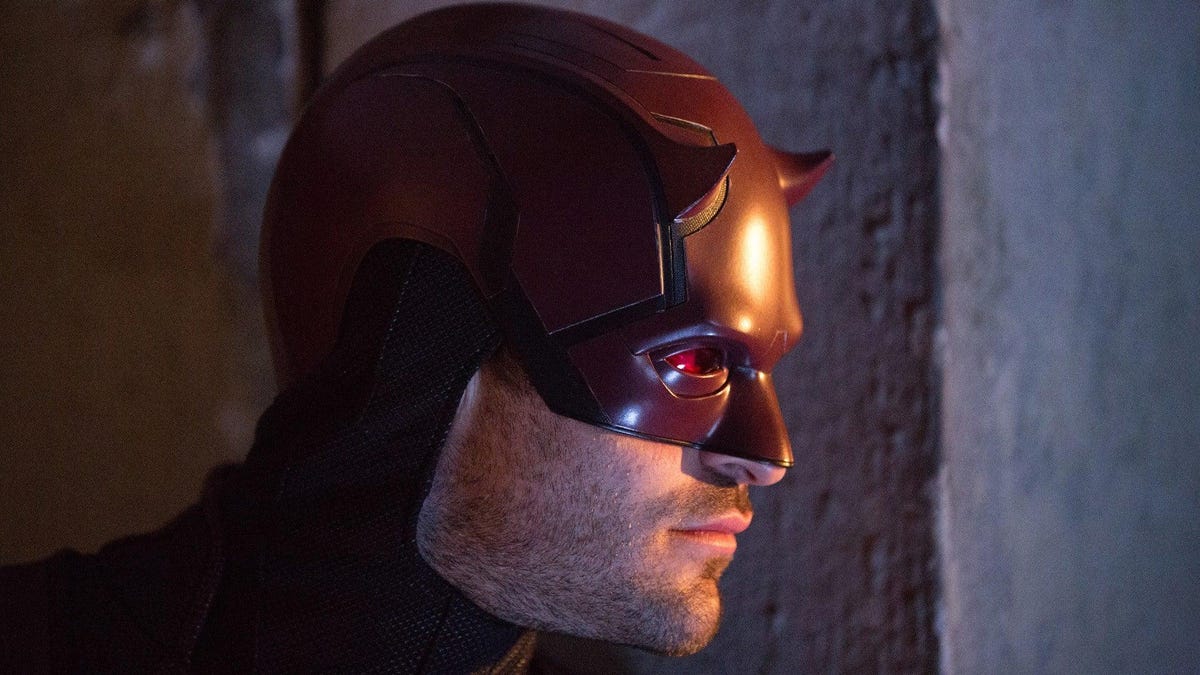
It feels like Daredevil has been fighting to be recognized as part of the wider Marvel universe since it first began nearly a decade ago—a fight that it’s had the upper hand in in fits and starts over those long years. But perhaps now, that war is finally over, and somehow wasn’t the case already with each consecutive time Charlie Cox showed up in a Marvel project lately. The real question is: what does it actually mean?
Echo, Marvel’s latest series, has long made it clear it wants to ape the kind of aesthetic and storytelling of those Marvel Netflix series of the past, and is leveraging parts of those shows to do so. Obviously, we have both Charlie Cox and Vincent D’Onofrio as major players in the series as Matt Murdock/Daredevil and Wilson Fisk/Kingpin, respectively, but the series has also played with using footage from Daredevil in its trailers to remind you that this show is like that show. But if that wasn’t enough, now Daredevil has that shiny seal of “MCU Canon Approval.”
Advertisement
Speaking to Screenrant in the run up to Echo’s release, executive producer Brad Winderbaum discussed the complicated relationship the Netflix-produced shows have had to what Marvel now dubs as “The Sacred Timeline” for its canonical material, and in doing so, affirmed the believe that now Daredevil has firmly joined that canon. “I can say that up until this point, we’ve been a little bit cagey about what’s Sacred Timeline, what’s not Sacred Timeline. That was born of, frankly, a period at the studio where we were like, ‘We have to stick the landing with the vendors.’ It was another part of the company developing the Netflix stuff,” Winderbaum said. “We were aware of what they were doing, they were aware of what we were doing, but there was a lot to balance anyway.”
Advertisement
“But now that some time has passed, now that we see actually how well integrated the stories are, I think that I personally, Brad Winderbaum, would be confident in saying [Daredevil] is part of the Sacred Timeline.” A statement which, in and of itself, still hedges around the question!
Advertisement
“We’re all fans of the Netflix series and all of the series that came about from that time, too,” fellow executive producer Richie Palmer similarly told io9 recently about Echo’s approach to Daredevil. “We wanted to honor it and make sure that, you know, fans felt like that was a part of this story, but not in any way that you needed to know that stuff. So we just wanted to make sure that it honored what came before it, but hopefully pushed it forward also and continues to push forward on the new Daredevil show.”
It’s somehow vindication for a series that, as well-received as it was, was kept at arms length by Marvel’s cinematic wing for much of its own existence—as Winderbaum pointed out, a lot of that distance is in part because Daredevil and its sister shows Jessica Jones, Luke Cage, and Iron Fist were all products of a separate collaboration with what was then Marvel Television and Netflix, a separate entity to Marvel Studios’ theatrical division. But also empty vindication considering that… well, does it really matter? Charlie Cox’s portrayal of Daredevil has now been everywhere from Spider-Man: No Way Home to She-Hulk recently, and will return for more stories in whatever Daredevil: Born Again ends up being—as will D’Onofrio’s Kingpin, after returning in Hawkeye. We’ve known these characters have been slotted into parts of the wider MCU already, did we really need that seal of approval? What does it add beyond what we could already infer from Murdock and Fisk’s prior appearances? Does the context of how these shows were made in the first place need to be fitted into what is, essentially, largely just an “It’s All Connected” marketing tag?
Advertisement
It’s an especially funny question to ask considering that Echo is meant to herald the era of what Marvel is dubbing “Spotlight” series, material that people can watch that operate as standalone and without the increasingly onerous weight of having to have seen as much prior material as possible. Saddling Echo as the proto-Daredevil sequel and the burden of its canonization ahead of Born Again—a show that, prior to its reworking, was seemingly aiming to not be a continuation of what came before—just speaks to the complex, complicated ways Marvel now has to deal with the shared universe boom it helped forge all those years ago in the first place.
Want more io9 news? Check out when to expect the latest Marvel, Star Wars, and Star Trek releases, what’s next for the DC Universe on film and TV, and everything you need to know about the future of Doctor Who.
Services Marketplace – Listings, Bookings & Reviews